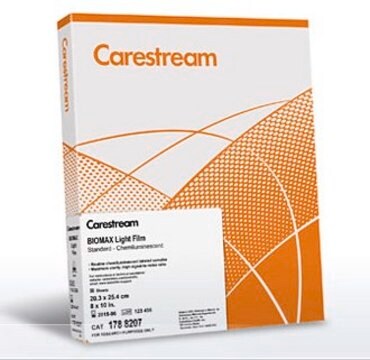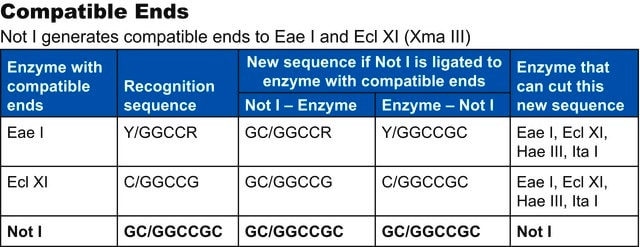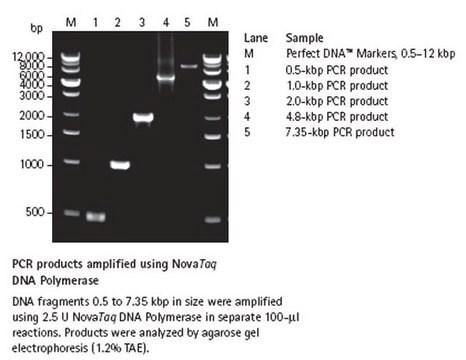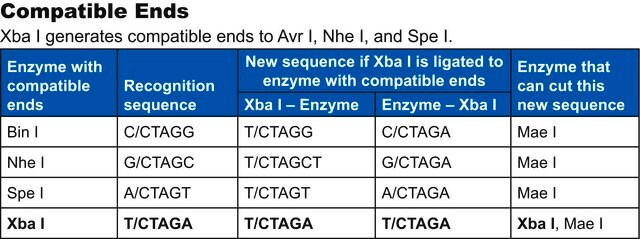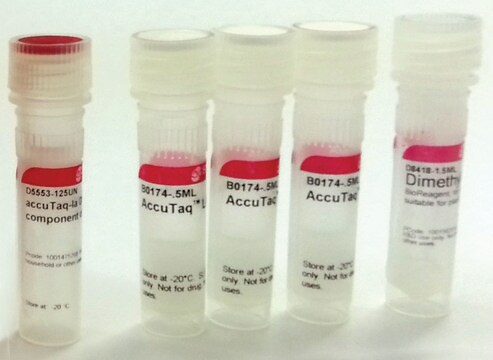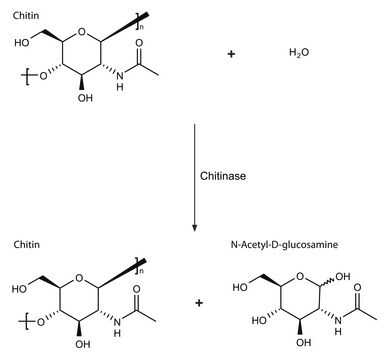R0260
BamH I from Bacillus amyloliquefaciens H
Restriction Enzyme
Autenticatiper visualizzare i prezzi riservati alla tua organizzazione & contrattuali
About This Item
Numero CAS:
Numero MDL:
Codice UNSPSC:
12352204
Prodotti consigliati
Grado
Molecular Biology
for molecular biology
Stato
buffered aqueous glycerol solution
Concentrazione
10,000 units/mL
Condizioni di spedizione
wet ice
Temperatura di conservazione
−20°C
Cerchi prodotti simili? Visita Guida al confronto tra prodotti
Specificità
Recognition sequence: 5′-G/GATCC-3′
Cutting results: a 2-10-fold Bam HI overdigestion of 1 μg λ DNA substrate results in 100% cutting
Heat inactivation: 60 °C for 15 minutes.
Star activity: To prevent star activity, avoid suboptimal reaction conditions containing low salt concentration, high glycerol (>5%) and high pH 8.0.
Cutting results: a 2-10-fold Bam HI overdigestion of 1 μg λ DNA substrate results in 100% cutting
Heat inactivation: 60 °C for 15 minutes.
Star activity: To prevent star activity, avoid suboptimal reaction conditions containing low salt concentration, high glycerol (>5%) and high pH 8.0.
Applicazioni
BamHI is a DNA restriction endonuclease that is used in molecular biology applications to cleave DNA at the recognition sequence 5′-G/GATCC-3′ to generate 5′-cohesive termini.
Altre note
Supplied with 10x Restriction Enzyme Buffer SB (B8781).
Stato fisico
Solution in 10 mM Tris-HCl, pH 7.4 , 1 mM EDTA, 1mM dithioerythritol, 300 mM KCl, 0.01% Polydocanol (v/v), 50% glycerol (v/v), at 4°C
Prodotti correlati
N° Catalogo
Descrizione
Determinazione del prezzo
Tampone di incubazione
N° Catalogo
Descrizione
Determinazione del prezzo
Codice della classe di stoccaggio
12 - Non Combustible Liquids
Classe di pericolosità dell'acqua (WGK)
WGK 1
Punto d’infiammabilità (°F)
Not applicable
Punto d’infiammabilità (°C)
Not applicable
Scegli una delle versioni più recenti:
Possiedi già questo prodotto?
I documenti relativi ai prodotti acquistati recentemente sono disponibili nell’Archivio dei documenti.
J H Ellis et al.
Journal of immunology (Baltimore, Md. : 1950), 156(8), 2700-2709 (1996-04-15)
CD80 and CD86 are cell surface glycoproteins expressed on a variety of professional APCs. They have attracted much attention due to their function as potent costimulators of T lymphocyte function through their interaction with CD28 and possibly CTLA4. Because inhibitors
Isolation of a sequence-specific endonuclease (BamI) from Bacillus amyloliquefaciens H.
G A Wilson et al.
Journal of molecular biology, 97(1), 123-125 (1975-09-05)
P Manivasakam et al.
Nucleic acids research, 29(23), 4826-4833 (2001-12-01)
Mammalian cells repair DNA double-strand breaks by illegitimate end-joining or by homologous recombination. We investigated the effects of restriction enzymes on illegitimate and homologous DNA integration in mammalian cells. A plasmid containing the neo(R) expression cassette, which confers G418 resistance
C Kessler et al.
Gene, 92(1-2), 1-248 (1990-08-16)
The properties and sources of all known class-I, class-II and class-III restriction endonucleases (ENases) and DNA modification methyltransferases (MTases) are listed and newly subclassified according to their sequence specificity. In addition, the enzymes are distinguished in a novel manner according
Cong Zhu et al.
Nucleic acids research, 41(4), 2455-2465 (2013-01-11)
Zinc-finger nucleases (ZFNs) have been used for genome engineering in a wide variety of organisms; however, it remains challenging to design effective ZFNs for many genomic sequences using publicly available zinc-finger modules. This limitation is in part because of potential
Il team dei nostri ricercatori vanta grande esperienza in tutte le aree della ricerca quali Life Science, scienza dei materiali, sintesi chimica, cromatografia, discipline analitiche, ecc..
Contatta l'Assistenza Tecnica.
